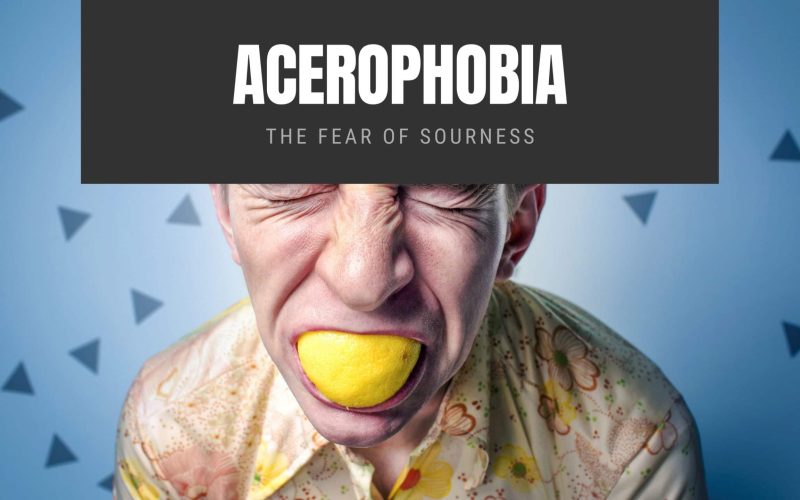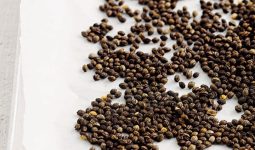The fear of sourness is often called Acerophobia. This mental disorder causes people to have a general fear of sour or bitter food.
This phobia is not only restricted to food, as those who have Acerophobia generally avoid anything that tastes sour or bitter to them.
Acerophobia is an irrational fear of sourness. People who suffer from this disorder find the mere thought of sourness highly provoking; consuming something that tastes bitter or has a sour taste could lead to various problems, including panic attacks.
Panic attacks might not always be the same for all who suffer from this disorder. But it Is likely to occur. Acerophobia is one of the most rare phobias.
Unlike thalassophobia (fear of the sea), cynophobia (fear of dogs), and pupaphobia (fear of puppets) e.t.c. Acerophobia is said to be even more rear than those as mentioned earlier.
Acerophobia patients usually find food like lemon, lime, sour candies to be dreadful and would do all they can to avoid them.
Acerophobia patients are usually unable to think coherently about their fear for sour foods, and most times, their reason for resisting this food lack logical meaning to them.
This, in turn, will make them unable to control the intense emotions linked to this condition.
Symptoms of Acerophobia
Acerophobia patient usually experiences a great deal of anxiety due to their intense fear of bitter and sour foods.
They are typically expected to experience some other side effects, which include increased heart rate, tension, sweating, sharper senses, and panic attacks.
In most cases, people with Acerophobia might avoid eating food prepared by others to ensure that they do not taste bitter or sour. They might even stick to eating just one food a day.
Some will only be concerned with ensuring that the food they eat is not unhealthy and sour because it is expired, so they stick to fresh food.
Below are some other acerophobia-related symptoms
- Extreme anxiety while eating sour food
- Intense anxiety while thinking of sour food
- Unable to cope with their anxiety
- Muscle tension, shakiness, and extreme sweating from just thinking about it
- In most cases, it might lead to a panic attack.
- Rapid breathing
- Irregular heartbeat
- Dry mouth
- Inability to articulate words
- Nausea
- The rise in the blood level
- Hyperventilation
- Confusion or disorientation
- Numbness
- Feeling faint
- Pain or tightness in the chest
- Choking sensation, etc.
Causes of Acerophobia
There is generally no known cause for some Acerophobia, but one could link it to genetic makeup and environmental factors.
These two play a considerable role in almost all kinds of phobias, and acerophobia is one of them.
If a family member had Acerophobia or any other mental disorder, then someone else from the same family might be prone to having this illness; this is from a genetic standpoint.
If the condition is met (genetic factor) or (environmental factor), then all they might need is just a traumatic experience to transform their condition into a full-blown Acerophobia.
For example, if someone were to fall sick from eating a portion of food or something sour in taste, they might develop Acerophobia and, from that point, start showing some symptoms of Acerophobia.
Another possibility is someone having a traumatic episode that had nothing to do with sour food or something that tastes sour.
Still, if the patient was eating something that feels sour, the person could likely develop Acerophobia just from that experience.
Treatment of Acerophobia
There are no sure treatments or treatments that are specifically designed for people who are suffering from Acerophobia, though there are some that are worth mentioning.
These practices have been known to work or to relieve some patients who were suffering from Acerophobia.
Exposure Therapy
Exposure therapy is a pervasive way of treating various forms of phobia. Exposure therapy works well for most patients suffering from phobias, including Acerophobia.
Its procedure is quite adequate, as people who have Acerophobia are gradually faced with things like lime or stuff with a sour taste.
Still, before they are exposed to sour food, they are first made aware or prepared to imagine themselves eating this acidic food.
The next face might include the patient eating sour food. This previous face would determine if the doctor would introduce the patient to eating acidic food, but it is routine to allow the patient to hold on to the sour food or fruit for a while.
During the process, the patient might be asked if he would like to eat the fruit. This is just one of the many ways exposure therapy works.
In the course of treating Acerophobia, the doctor might show pictures of various people eating sour food; after some time, he might also have to introduce said patients to a video of people or someone eating sour food.
This method is proposed to help disordered patients or Acerophobia patients get over their fear of a sour thing, as the more they get exposed to what they are afraid of, the less scared they would be.
Medications
Taking anti-anxiety pills has been known to help reduce the intensity of some forms of Acerophobia; the same goes for some antidepressant medications.
Though taking medicine alone by itself might not yield a positive result, it has been known to help people suffering from Acerophobia.







